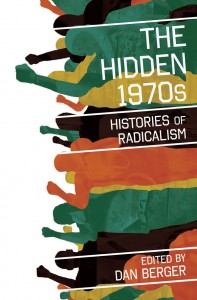Monday, December 6, 7pm – Non-Fiction Panel
Dan Berger editor of The Hidden 1970s: Histories of Radicalism (26.95 Rutgers University Press)
 Moderator Panel includes: Barbara Easley Cox (Black Panther Party), Michael Simmons (SNCC), Sharon McConnell (October 4th Organization), Sherrie Cohen (Dyketactics)
Moderator Panel includes: Barbara Easley Cox (Black Panther Party), Michael Simmons (SNCC), Sharon McConnell (October 4th Organization), Sherrie Cohen (Dyketactics)
The 1970s were a complex, multilayered, and critical part of a long era of profound societal change. Indeed, several iconic events of “the sixties” occurred in the ten years that followed. The Hidden 1970s explores the distinctiveness of those years, a time when radicals tried to change the world as the world changed around them. This powerful collection is a compelling assessment of a wide variety of left-wing social movements during a period that many have described as dominated by conservatism or confusion. Contributors examine critical and largely buried legacies of the 1970s. Their essays provide fascinating insight into the myriad ways that radical social movements shaped American political culture in the 1970s and how they continue to do so today.
Barbara Easley Cox was born and raised in Philadelphia. She joined the Black Panther Party in California during the 1960s. Upon returning to Philadelphia in 1973, she became a social worker for the commonwealth of Pennsylvania during which time she joined the Alliance of Black Social Workers, the Advocate Community Development Corporation(ACDC), and was involved in many other community-based activities. She retired as a social worker in 2003 and currently works with a non-profit bookstore teaching literacy to young people.
Michael Simmons is a human rights activist and native Philadelphian who has been working in peace and justice activities for more than 40 years. At the age of 19, Michael and close friend organized a march of 3,000 people in Philadelphia in support of the 1965 March on Selma, Alabama, to secure voting rights for African Americans. Soon after, Michael moved to the South, where he became an active member of the Student Non-violent Coordinating Committee (SNCC). Between 1965 and 1967, Michael was a SNCC organizer in Virginia, North Carolina, Georgia, Alabama, Mississippi, and Arkansas. He co-authored the SNCC Black Consciousness Paper and its statement against the Vietnam War. Michael also spent two and a half years in jail for his own refusal to be inducted into the military. In the 1970s Michael was organizing for workers rights and for the decolonization of the countries in southern Africa. He was a member of the Philadelphia Worker Organizing Committee, and served as the National Director for Housing and Employment for the American Friends Service Committee (AFSC). He played a leading role in the formation of the Southwest Workers Federation, a group of 300 workers in seven cities, organized around class action employment discrimination law suits. The lawsuits resulted in nearly 500 workers either securing employment or moving to a higher employment grade. Michael was instrumental in the formation of a worker-controlled law firm to facilitate this work. He also helped lead the divestment campaign within the anti-apartheid movement as Director of the AFSC’s Southern Africa Program. Currently he lives in Budapest, where he continues to be a peace and social justice organizer.
Sharon McConnell grew up in a row house in the white working-class community of Kensington in Philadelphia in the 1960s. In the early 1970s a friend introduced Sharon to the October 4th Organization (O4O), a community-based organization working to organize Kensington through campaigns promoting class, racial, ethnic, and gender solidarity. O4O saw itself as part of an international, revolutionary movement, working to eliminate capitalist inequalities and establish a more equal and just society. Sharon eventually became a member of the O4O steering committee. O4O campaigned against utility shutoffs and evictions, demanded better local schools, worked as part of the “Stop Rizzo” campaign, fought police brutality, resisted the Vietnam War, and organized for decent health care against the racist policies of some local hospitals. She was particularly affected by her work in coalition with women of color, opposing oppression by class, gender, and race. After O4O, Sharon continued working in progressive movements including the anti-nuclear movement, and became co-chair of the New Jersey Nuclear Freeze Campaign. She was a founding member of the South Jersey Campaign for Peace and Justice and the Greater Camden Unity Coalition. Sharon later won a scholarship for returning women and attended the University of Pennsylvania and Temple University. She just completed her Ph.D. Her dissertation studies the radical-socialist organizing among Kensington hosiery workers in the 1920s and 1930s.
Sherrie Cohen was an anti-war activist and an activist in the Philadelphia lesbian feminist collective, DYKETACTICS!, which conducted actions to raise public consciousness and electrify the imagination of the gay and women’s communities. She is a lifelong activist committed to social and economic justice, feminist and LGBTQ organizing, neighborhood organizing and progressive electoral work.
Dan Berger (moderator) is the editor of The Hidden 1970s: Histories of Radicalism, a new anthology that chronicles some of the many social movements in that pivotal decade. A longtime anti-prison activist, he has lived in Philadelphia for the past seven years and is currently a postdoctoral research fellow at the University of Pennsylvania.